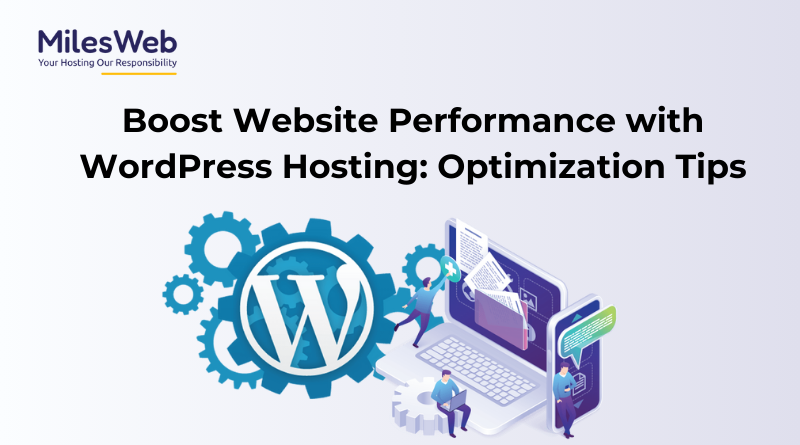
Nowadays most businesses need a website which is the backbone of any business or individual to prove that it exists at least on the web. Being one of the heavyweight content management system reasons lots of us choose WordPress to build almost any website you can think of. Yet the performance of your WordPress website has a large effect on user experience and is the driver behind search engine rankings and overall possibilities. Enter premium managed WordPress hosting, that is where we come in.
WordPress hosting charges are very affordable, and you can find reliable service providers such as MilesWeb which gives you an abundance of configuration options. Thus, whether you are a blogger, eCommerce store owner, or want to launch your business online by creating a name for it, understanding how to use WordPress hosting in your favour will help you get there more efficiently. If you wish to make your WordPress website perform well by following these optimization tips.
Table of Contents
WordPress Web Performance Optimization Tips
1. Select Proper WordPress Hosting Plan
Well in the first place, the performance of your website is dependent on a web hosting plan when picking up a performance WordPress website. There are various types of web hosting, like shared hosting, VPS (Virtual Private Server), and dedicated and managed WordPress hosting. Shared hosting is the cheapest but can be very restrictive regarding performance, in case your website takes a lot of traffic.
VPS hosting offers more resources and better performance but requires some technical knowledge to manage. Dedicated hosting provides the highest level of performance and control but is also the most expensive. Managed WordPress hosting is a WordPress hosting specialized service, suitable for the performance focus, automatic updates, and expert support that both experienced users as well as non-web savvy alike will love.
Selecting a hosting plan weighs up your website requirements and also your budget and experience level. If you’re just getting started, maybe shared is enough. But as your website scales, it might be time to upgrade. Managed WordPress hosting is especially handy for those using WordPress as a platform to focus on content creation and marketing rather than battling technological website management issues.
Suggested Read: Beginner’s Guide to Picking the Perfect Web Hosting Service
2. Optimize Your Website’s Speed
Website speed is very important for the user experience: SEO (Search Engine Optimisation). Search engine rankings, on the one hand, slow websites cause higher bounce rates, and reduced engagement. Choose a High quality and Durable web hosting provider milesweb for optimizing your WordPress site speed. They offer 99.9% uptime with a customized plugin set and enhanced load times. Also, their team installs essential plugins only on your servers and databases.
To optimize your WordPress website’s speed, choose a fast and reliable web hosting provider. Use a light weight and nicely coded theme as heavy themes will put your website load. Do not use too many plugins, or else the load times will go up. Use only plugins essential for you and make sure you are keeping them updated.
3. Implement Security Measures
Security of a website is one essential factor when it comes to website performance mainly protecting your data, but trust in your client. WordPress hosting companies generally include a few more protection tools such as automated backups, malware checkers, and firewalls. Also, make sure to get hosting with these features integrated and be on the lookout for plug-ins that allow extra prevention such as Wordfence or Sucuri.
It is critical for your security that you keep WordPress core, themes/ plugins updated regularly. You also miss out on your software vulnerabilities using outdated software. If possible, use automatic updates; otherwise, schedule some time to manually update your site regularly. Also, try strong passwords and implement 2-factor authentication — another added security.
4. Leverage Caching Solutions
Caching is a method to store cached versions (in memory, cookie, or database formats) for your website’s page which your server would not have to generate from scratch every time a user visits. This is a good way to shorten load times and lower the server’s caching. A few popular caching WordPress plugins are WP Super Cache and W3 Total Cache so you only have to do some of your caching yourself.
When picking a caching solution, think of your website requirements and the capabilities of the plugin. Advanced features such as database caching and object caching are also implemented by some plugins and may provide better performance. Install only plugins that are compatible with your host and other third-party plugins you have.
Also Read: MilesWeb Review: Should You Consider Opting For its WordPress Hosting?
Summing Up
Ultimately, optimising website performance of your WordPress site is the key for best user experience and all your online success. Optimizing the speed of a website, security measures, using caching solutions and keeping an eye on server resources from WordPress performance boost web hosting plan to .
Optimizing your WordPress website requires a lot of time and effort, but still it is worth it. With the right tools of MilesWeb, you can have a website that is properly run, loads at lightning speed and makes your users feel safe & comfortable.
